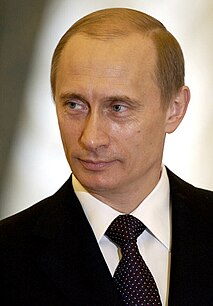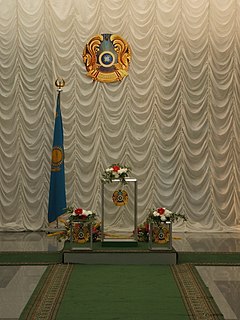Administrative resource is the ability of political candidates (and parties) to use their official positions or connections to government institutions to influence the outcome of elections.
A political party is an organized group of people, often with common views, who come together to contest elections and hold power in the government. The party agrees on some proposed policies and programmes, with a view to promoting the collective good or furthering their supporters' interests.

An election is a formal group decision-making process by which a population chooses an individual to hold public office. Elections have been the usual mechanism by which modern representative democracy has operated since the 17th century. Elections may fill offices in the legislature, sometimes in the executive and judiciary, and for regional and local government. This process is also used in many other private and business organizations, from clubs to voluntary associations and corporations.
The term is widely used in Russia and other former USSR countries, because the practice is widespread, is well known and is openly discussed by public and media. In these countries, the administrative resource is one of the major factors in most elections. Although similar practices of corruption are conducted throughout the world in countries with fragile democracies, the term administrative resource is ascribed almost exclusively to Russia. Moreover, the utilization of administrative resources is generally not considered to be a democratic form of electioneering but in fact as a tool used to undermine democracy. [1]

Russia, officially the Russian Federation, is a transcontinental country in Eastern Europe and North Asia. At 17,125,200 square kilometres (6,612,100 sq mi), Russia is the largest country in the world by area, covering more than one-eighth of the Earth's inhabited land area, and the ninth most populous, with about 146.77 million people as of 2019, excluding Crimea. About 77% of the population live in the western, European part of the country. Russia's capital, Moscow, is the largest metropolitan area in Europe proper and one of the largest cities in the world; other major cities include Saint Petersburg, Novosibirsk, Yekaterinburg and Nizhny Novgorod. Extending across the entirety of Northern Asia and much of Eastern Europe, Russia spans eleven time zones and incorporates a wide range of environments and landforms. From northwest to southeast, Russia shares land borders with Norway, Finland, Estonia, Latvia, Lithuania and Poland, Belarus, Ukraine, Georgia, Azerbaijan, Kazakhstan, China, Mongolia and North Korea. It shares maritime borders with Japan by the Sea of Okhotsk and the U.S. state of Alaska across the Bering Strait. However, Russia recognises two more countries that border it, Abkhazia and South Ossetia, both of which are internationally recognized as parts of Georgia.
The administrative resource is only one part that determines the election outcome. Two other major factors are the ideology (candidate's agenda) and the use of political technologies (PR, campaign organisation, etc.).
An ideology is a collection of normative beliefs and values that an individual or group holds for other than purely epistemic reasons. The term is especially used to describe a system of ideas and ideals which forms the basis of economic or political theory and policy. In political science it is used in a descriptive sense to refer to political belief systems. In social science there are many political ideologies.
Public relations (PR) is the practice of managing the spread of information between an individual or an organization and the public. Public relations may include an organization or individual gaining exposure to their audiences using topics of public interest and news items that do not require direct payment. This differentiates it from advertising as a form of marketing communications. Public relations is the idea of creating coverage for clients for free, rather than marketing or advertising. But now advertising is also a part of greater PR Activities. An example of good public relations would be generating an article featuring a client, rather than paying for the client to be advertised next to the article. The aim of public relations is to inform the public, prospective customers, investors, partners, employees, and other stakeholders and ultimately persuade them to maintain a positive or favorable view about the organization, its leadership, products, or political decisions. Public relations professionals typically work for PR and marketing firms, businesses and companies, government, and public officials as PIOs and nongovernmental organizations, and nonprofit organizations. Jobs central to public relations include account coordinator, account executive, account supervisor, and media relations manager.
Among many different ways the administrative resource can be applied are:
- Mobilisation of organisational and financial resources. The authorities can easily pressure businessmen to fund preferred candidates and parties. Before Russian parliamentary elections the money is often used to create "authorities parties", based not on a particular ideology but on affiliation with the government and easy access to money.
- The laws can be selectively applied to assist friendly candidates, by hindering their competition. The authorities can use frequent tax inspections, police searches and arrests to punish businessmen who fund the competing candidates.
- The authorities can use the election laws to their advantage, for example, by creating a pretext for appealing the results later if the unfavourable candidate is winning. Another option is to stop from voting some groups of people who are likely to vote against the preferred candidate.
- Government controlled organisations, such as the army, prisons, hospitals, public schools, etc. can be mobilised for signature collection and other goals. They can also pressure their employees and customers for voting for particular candidates and exercise control over votes by housing the polling stations.
- Redistribution of budget funds. The authorities can bribe the electorate indirectly by repaying pension debts, indexing salaries, etc. The federal government can control governors by measuring donations to their regions.
- Controlling the mass media. The heads of states or regions can easily create news topics for media, getting free publicity and circumventing the limits for TV advertisements imposed on all candidates. This method was used with particular effectiveness in Russian presidential election, 2004.
- Falsifying the election results. Additional ballots can be introduced under the names of those who didn't vote, ballots for "wrong" candidate can be invalidated by damaging them, ballots can be replaced. The authorities can also control the staff of the election committees and prevent control by independent observers.
The mass media is a diversified collection of media technologies that reach a large audience via mass communication. The technologies through which this communication takes place include a variety of outlets.














